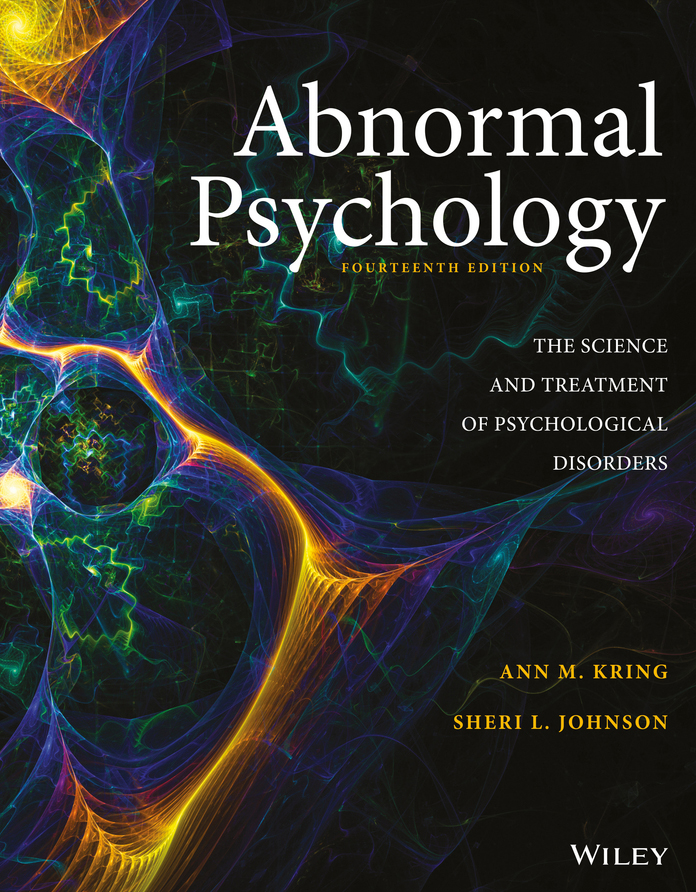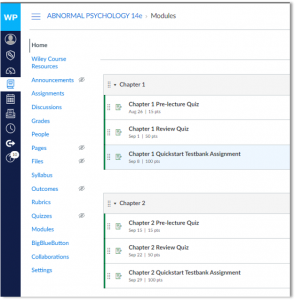
Abnormal Psychology: The Science and Treatment of Psychological Disorders, 14th Edition
By Ann M. Kring and Sheri L. Johnson
Abnormal Psychology blends traditional content with interactive and multimedia assets and online tools. The text consists of a careful balance of research and clinical application, and the use of paradigms as an organizing principle. It involves the learning in the kinds of real-world problem solving used by clinicians and scientists. Students learn that psychopathology is best understood by considering multiple perspectives and that these varying perspectives provide the clearest account of the causes of these disorders as well as the best possible treatments. The 14th edition is now available with the new WileyPLUS online platform and provides instructors with the freedom and flexibility to tailor curated content, and easily customize and manage their course, and presents students with a clear learning path designed to engage and motivate them so they succeed in the course.
Schedule a Demo Request Instructor AccountWant to learn more about WileyPLUS? Click Here
Interactives engage students.
Interactive graphics allow students to engage with material to test their understanding of a concept.
Updated videos and follow-up questions enhance the learning experience.
The Case Study Videos have been updated to reflect DSM-5 and have a consistent, more modern look. Pause and Ponder Questions are available with these case study videos, allowing students to think critically about the concepts in the videos they are watching.

Self-Scoring Practice
Self-scoring practice exercises help students see what they’ve mastered and what they still need to master before completing higher-stakes online homework or assessment assignments.

Pre-created Assignments
Pre-created Assignments allow instructors to save time by choosing from an extensive bank of assignments they can to add to their course. These assignments often highlight questions with embedded audio or video and links to the text. A specific Test Bank Assignment area is available for instructors, allowing them to choose from a different set of questions than those found in the quizzes.
What’s New:
- NEW Sharpened Focus: Discarding reviews of now outdated theories that lack solid empirical support, this course focuses on the most exciting and accepted current theories, research, and treatments.
- NEW and Updated References, Figures, and Clinical Cases: Hundreds (over 800) of updated references are provided. New figures and tables carefully illustrate various concepts, and several new Clinical Cases illustrate the ways in which real people experience psychological disorders.
- NEW Pedagogy: Pedagogy has been added based on feedback from students and professors. New Focus on Discovery boxes showcase cutting-edge research on particular topics, and new and modified Check Your Knowledge questions let students do a quick check to verify they are learning and integrating the material. Drawing on evidence for the importance of generative thinking for learning, many of the questions are now open-ended.
- NEW Photos and Well-Known Faces Illustrate Real-World Examples: New photos provide students with additional real-world examples and applications of psychopathology, including examples of some highly successful and well-known people who have come forward to discuss their own psychological disorders.

ANN M. KRING is professor and chair of psychology at the University of California at Berkeley. She received her B.S. from Ball State University and her M.A. and Ph.D. from the State University of New York at Stony Brook. Her internship in clinical psychology was completed at Bellevue Hospital and Kirby Forensic Psychiatric Center, both in New York. From 1991 to 1998, she taught at Vanderbilt University. She joined the faculty at UC Berkeley in 1999 and served two terms as Director of the Clinical Science Program and Psychology Clinic. She received a Distinguished Teaching Award from UC Berkeley in 2008. She is on the editorial boards of Schizophrenia Bulletin, Journal of Abnormal Psychology, and Psychological Science in the Public Interest, and she is a former associate editor for Journal of Abnormal Psychology, Cognition and Emotion, and Applied & Preventive Psychology. She was elected president of the Society for Research in Psychopathology and president of the Society for Affective Science.
She was awarded a Young Investigator Award from the National Alliance for Research on Schizophrenia and Depression (NARSAD) in 1997 and the Joseph Zubin Memorial Fund Award in 2006 in recognition of her research in schizophrenia. In 2005, she was named a fellow of the Association for Psychological Science. Her research has been supported by grants from the Scottish Rite Schizophrenia Research Program, NARSAD, and the National Institute of Mental Health. She is a co-editor (with Denise Sloan) of Emotion Regulation and Psychopathology (Guilford Press) and co-author (with Janelle Caponigro, Erica Lee, and Sheri Johnson) of Bipolar Disorder for the Newly Diagnosed (New Harbinger Press). She is also the author of more than 100 articles and book chapters. Her current research focus is on emotion and psychopathology with a specific interest in the emotional features of schizophrenia, negative symptoms in schizophrenia, and the linkage between cognition and emotion in schizophrenia.

SHERI L. JOHNSON is professor of psychology at the University of California at Berkeley, where she directs the Cal Mania (CALM) Program. She received her B.A. from Salem College and her Ph.D. from the University of Pittsburgh. She completed an internship and postdoctoral fellowship at Brown University, and she was a clinical assistant professor at Brown from 1993 to 1995. From 1995 to 2008, she taught in the Department of Psychology at the University of Miami, where she was recognized three times with the Excellence in Graduate Teaching Award. In 1993, she received a Young Investigator Award from the National Alliance for Research in Schizophrenia and Depression. She is a consulting editor for Clinical Psychological Science and Journal of Abnormal Psychology, and she serves on editorial boards for six journals. She has served as the president for the Society for Research in Psychopathology and is a fellow of the Academy of Behavioral Medicine Research, the Association for Behavioral and Cognitive Therapies, and the Association for Psychological Science.
For the past 25 years, her work has focused on understanding the factors that predict the course of mania and depression. She uses social, psychological, and neurobiological paradigms to understand these processes. Her work has been funded by the National Alliance for Research on Schizophrenia and Depression, the National Cancer Institute, the National Science Foundation, and the National Institute of Mental Health. She has published over 200 articles and book chapters, and her findings have been published in leading journals such as the Journal of Abnormal Psychology, Psychological Bulletin, and the American Journal of Psychiatry. She is co-editor or co-author of several books, including Psychological Treatment of Bipolar Disorder (Guilford Press), Bipolar Disorder for the Newly Diagnosed (New Harbinger Press), Bipolar Disorder: Advances in Psychotherapy Evidence-Based Practice (Hogrefe Publishing), and Emotion and Psychopathology (American Psychological Association).
- Introduction and Historical Overview
- Current Paradigms in Psychopathology
- Diagnosis and Assessment
- Research Methods in Psychopathology
- Mood Disorders
- Anxiety Disorders
- Obsessive-Compulsive-Related and Trauma-Related Disorders
- Dissociative Disorders and Somatic Symptom-Related Disorders
- Schizophrenia
- Substance Use Disorders
- Eating Disorders
- Sexual Disorders
- Disorders of Childhood
- Late Life and Neurocognitive Disorders
- Personality Disorders
- Legal and Ethical Issues

